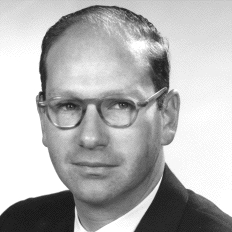
| ASC HOME |
|
BACK (Cyberneticians) |
Dr. Lawrence J. Fogel

Dr. Fogel, circa 1961
Legacy Webpage
His interest in cybernetics grew from early research in human factors analysis for flight instrumentation in aircraft and helicopters in the 1950s. As early as 1956, he conceived and formulated a solution for a mathematical model of the human operator as part of an aircraft flight control system which included such qualities as anticipation, development of a computer facility incorporating such a mode for use in the design of more effective man-machine relations. As a Design Specialist working at General Dynamics (Convair Division) in San Diego, he was responsible for human engineering systems analysis and design for manned aircraft. He initiated a program of investigation into the use of anticipatory displays which allow the pilot to "fly ahead" of the aircraft. This program successfully proceeded from a theoretical study to the experimental phase, utilizing analog computers for both simulation and empirical data reproduction.
While on leave from Convair (1960-1961), Dr. Fogel served as Special Assistant to the Associate Director of Research (Richard Bolt) of the National Science Foundation and reviewed and projected the needs of the nation in light of scientific advancement.
Upon returning to General Dynamics (Astronautics) in 1961, he conducted a research program to generate artificial intelligence through top-down simulations of evolution on computers, this in direct contrast to more "traditional" methods of AI which used bottom-up modeling of biological and psychological human processes.
From 1965 to 2007 he continued to apply methods of evolutionary programming to real-world problems in industry, medicine, and defense and helped organize conferences and publications in the areas of machine and human intelligence. His Ph.D. dissertation "On the Origin of Intellect" with UCLA and book "Artificial Intelligence Through Simulated Evolution" co-authored with Owens and Walsh were the first of their kind and considered pioneering advancements in the field of evolutionary computation and computational intelligence.
Dr. Fogel served as President of the American Society of Cybernetics in 1969, following Warren McCulloch. He also served as the founding Editor-in-Chief of the Journal of Cybernetics, the transactions of the ASC. He helped organize and co-edit the Proceedings of the Second and Third Annual ASC Symposia (1964, 1965), providing the keynote address at the latter meeting in which he concluded "it was my privilege to be among those who participated in this event in the 'coming of age' of cybernetics."
He was honored as a Fellow of the IEEE and was awarded the inaugural IEEE Frank Rosenblatt Technical Field Award in 2006.
Dr. Fogel passed away in February, 2007.
References
1957 - 1971
-
Fogel, L. J. "The Human Computer in Flight Control," I.R.E. Transactions on Electronic Computers, Vol. EC-6, No. 3, pages 197-202, 1957.
-
Fogel, L. J. "A New Concept: The Kinalog System," Journal of the Human Factors Society, Vol. 1, No. 2, pages 30-37, April 1959.
-
Fogel L. J. and Lyman J "The Human Component," Chapter 2 in Volume 3 of The Handbook of Automation, Computation, and Control, edited by E. M. Grabbe, S. Ramo, and D. E. Woolridge, John Wiley and Sons, Inc., New York, 1961.
-
Fogel L. J. "Autonomous Automata," Industrial Research Magazine, Vol. 4, No. 2, pages 14-19, February 1962.
-
Fogel L. J., Owens AJ, and Walsh, MJ "On the Evolution of Artificial Intelligence," Proceedings of the Fifth National Symposium on Human Factors in Electronics, IEEE, San Diego, May 5-6, 1964, pages 63-76.
-
Fogel L. J., Owens AJ, and Walsh, MJ "An Evolutionary Prediction Technique," International Symposium on Microwaves, Circuit Theory, and Information Theory, IEEE, September 1964, pages 173-174.
-
Fogel, L. J., Owens AJ, and Walsh, MJ "Artificial Intelligence Through a Simulation of Evolution," Chapter 14 of Biophysics and Cybernetic Sciences Symposium, edited by M. Maxfield, A. Callahan, and L. J. Fogel, Spartan Book Co., Washington, D.C., pages 131-155.
-
Fogel L. J., Owens AJ, and Walsh MJ Artificial Intelligence Through Simulated Evolution, John Wiley & Sons, Inc., New York, 1966.
-
Fogel L. J., Owens AJ, and Walsh, MJ "Application of Evolutionary Programming," Record of the IEEE Systems Science and Cybernetics Conference, October 17 and 18, 1966, Washington, D.C.
-
Modeling of Thinking and the Mind, by N. M. Amosov, translated by L.J. Fogel and L. Finegold, Spartan Books, Inc., New York, 1967.
-
Fogel L. J. Human Information Processing, Prentice-Hall, Inc., Englewood Cliffs, New Jersey, 1967.
-
Fogel L. J., "Inanimate Intellect Through Evolution," Naval Research Reviews, Vol. XX, No. 11, November 1967, pages 9-18.
- The Cybernetics of Conflict Resolution, Proceedings of the Third Annual Symposium of the American Society for Cybernetics, coedited by D. E. Knight, H.W. Curtis, and L.J. Fogel, Spartan Book Company, New York, 1971.
| TOP of Page |